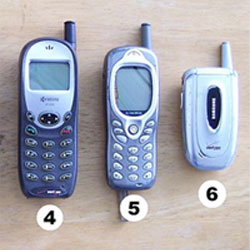There are few of us who have not lost possessions during a burglary at home - or at least know somebody who has. And it is not always about smashed gates, broken glass and jimmied locks; adept burglars can often clean you out without leaving any sign of forced entry.

(Image: Wikimedia Commons)
A series of alarming photographs sent out by a local security company showed a slightly built man demonstrating to police how he could climb through an A4-size opening between normal burglar bars. And in a recent house robbery in my neck of the woods, thieves used the pet entrance (doggy flap) in a door to gain access.
It's not just in our homes where criminals outsmart us. The subtle jamming of car central locking systems using remote control devices, leaving a car at risk of theft, goes to show just how sophisticated crime has become.
Which is why I'm uneasy with an exclusion in MTN's cellphone insurance policy.
Unlike cover from Vodacom and Cell C, MTN won't pay out on a theft claim if there's no forced entry that "necessitates repairs".
When Sunday Times reporter Bongani Mthethwa claimed for his stolen Samsung Galaxy S4 from MTN last month, he was sent packing. Because there was no visible sign of forced entry or damage to the doors or windows of his rented Glenwood flat, the network refused to pay out.
The journalist had been asleep when an intruder is believed to have entered his flat through a closed, barred toilet window. "How he [the thief] opened the window from the outside I don't know," said Mthethwa. But the next morning he, with his neighbour and the flat cleaner, found black marks on the burglar guards, a lightbulb from the outside corridor light removed and set aside, and toilet cleaning brushes from the windowsill lying in the passageway.
"The main door of the flat had also been opened, which suggests that the suspect tried to use it to get out but was prevented from doing so by the locked burglar gate.
"He then used the same toilet window to get out," said Mthethwa. All this was detailed in the police report Mthethwa filed the same day.
When officers arrived to take fingerprints, they noted the spacing between the window's burglar bars and told Mthethwa a small person could well have made it through.
Deafening silence
I asked MTN, underwritten by Guardrisk, to justify a stance that affects tens of thousands of its policyholders. When I hadn't heard anything 10 days later, I queried the silence with MTN. Two hours later, Mthethwa's claim for the R7,950 phone was suddenly approved. After paying a R350 excess, he collected a new phone and sim card in-store.
I asked MTN to explain the about-face. No response. I asked again four days later. Nothing.
Vodacom and Cell C, meanwhile, were able to clarify within a day how their customers were covered. Neither exclude theft claims from homes if there's no forced entry. Consumers whose car locks are jammed may be covered by Cell C if there's a police report or affidavit. Lock jamming is not covered by Vodacom's policy.
Mthethwa paid R100 a month to MTN for his cover. Cell C, underwritten by Etana Insurance Company, insures the same phone for R149 a month and Vodacom, which underwrites its own insurance, charges R159.
Oddly, when Mthethwa received new policy documents, and a R106 premium, for his replacement phone this week, the offending exclusion was nowhere to be found.
Theft from a car, however, still requires forced entry before a claim will be honoured.
An alternative to cover from a mobile service provider is standalone cellphone cover taken from an insurer directly.
Then there's the more expensive, and comprehensive, all-risks insurance (personal goods cover) which covers portable items - like handbags, laptops, cellphones, spectacles, and leather jackets - as specified items added to an existing homeowner's policy. An additional premium for each specified item is usually charged.
No evidence? Little chance of success
When there's a dispute around such forced entry exclusions, consumers can turn to the ombudsman for short-term insurance for possible relief. Although, if they don't have proof of a break-in, they may battle to make their case.
"Without evidence, even our office or the courts for that matter, would not be able to assist," said senior assistant ombud Peter Nkhuna. He said South Africa's legal system was based on the principle that the onus of proof lay with the person making an allegation, so the odds were generally against the insured where such exclusion clauses were part of the policy terms and conditions.
Nkhuna said the clause was used by insurers to avoid liability in instances where the insured was careless or even reckless.
"However, there may be circumstances under which to reject the claim simply based on the fact that there are no signs of forced entry or exit may result in unfairness.
"If the facts can clearly show this, then our office will intervene to prevent that unfair outcome."
•Tune in to Power FM's Power Breakfast at 0850 today to hear more from Megan
Source: Sunday Times, via I-Net Bridge





































